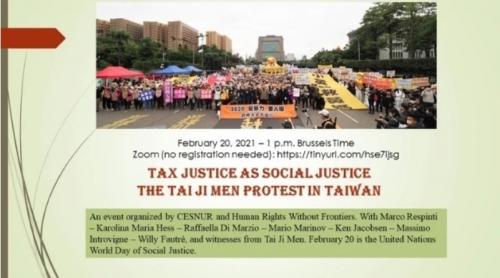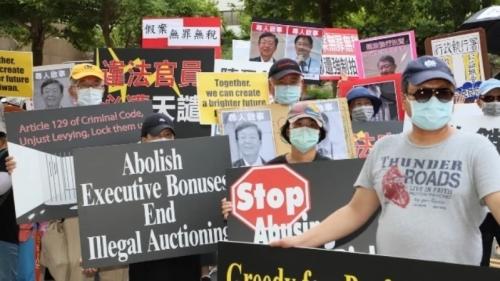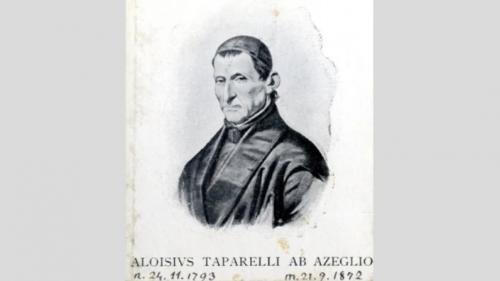Social Justice, Taxes, and Freedom of Religion or Belief
A Webinar revisited the notion of “social justice,” and how it was violated in the Tai Ji Men tax case in Taiwan.

February 20 was the United Nations World Day of Social Justice. CESNUR, the Center for Studies on New Religions, and Human Rights Without Frontiers organized a Webinar on “Tax Justice as Social Justice: The Tai Ji Men Protest in Taiwan,” part of a cycle of monthly seminars on the tax case involving the Taiwan-based spiritual movement.
Tai Ji Men is a menpai (similar to a school) of qigong, martial arts, and self-cultivation rooted in esoteric Taoism. It was among the targets of a 1996 crackdown against new religious movements in Taiwan, and its leader Dr Hong Tao-Tze was arrested. Although both he and his co-defendants were eventually declared innocent of all charges, tax bills continued to be issued even after the final decision favorable to Tai Ji Men in the criminal cases.
Ignoring the opinion of the highest courts in Taiwan, which declared that no criminal offence or tax evasion existed, the National Tax Bureau maintained its tax bill against Dr. Hong for the year of 1992, and conducted the compulsory execution. This led in 2020 to auctioning two times and then confiscating land belonging to the leader of Tai Ji Men and intended for the building site for a place where Tai Ji Men could practice self-cultivation, which in turn caused large street protests in Taiwan.

Protests for the Tai Ji Men tax case in Taiwan.
Massimo Introvigne, the founder and managing director (Center for Studies on New Religions (CESNUR) mentioned I had the privilege of introducing the testimonies of several dizi (disciples of Tai Ji Men) who were part of the events. That social justice is a contested notion, and in the late 20th century some scholars such as Friedrich von Hayek suggested it should be abandoned because of its ambiguous meaning. My opinion is that it should be rather reinterpreted, going back to the Italian clergy who first defined it in the 19th century, Luigi Taparelli d’Azeglio, Antonio Rosmini-Serbati, and Taparelli’s student Gioacchino Pecci, who became the Pope of the Catholic Church under the name of Leo XIII. For them, social justice was about fairness and treating equal situations in an equal way, but with a special attention to vulnerable categories.

Father Luigi Taparelli d’Azeglio, credited with the first systematic treatment of social justice (credits).
While recently all the attention has focused on groups that are vulnerable as targeted by racism—a real problem, of course—a broader notion of vulnerability should include others, such as members of spiritual minorities and taxpayers treated unfairly by semi-omnipotent bureaucrats. And here is where the case of Tai Ji Men becomes so important.
Introducing the event Marco Respinti, director-in-charge of Bitter Winter, said that the Tai Ji Men case is both a tragedy, as what happened was a blatant case of human rights violation, and a source of hope, because of the courage and bravery of the Tai Ji Men dizi (disciples) who maintained their peaceful protest for 25 years.
Karolina Maria Hess, from the Institute of Sociology at the University of Silesia in Katowice, Poland, and Mario Marinov, from the Department of Sociology at the South-West University Neofit Rilski in Blagoevgrad, Bulgaria, compared the situation of Tai Ji Men with discrimination of religious minorities in their countries. Although in theory religions should be treated equally, including when it comes to their tax status, according to the Polish and Bulgarian Constitutions, in practice the majority religions are protected and minorities are harassed through the use of discriminatory tax treatments.
Raffaella Di Marzio, the head of Rome’s LIREC (Center for Studies on Freedom of Religion, Belief and Conscience) mentioned that her organization signed several letters to Taiwanese authorities denouncing the injustices perpetrated in the Tai Ji Men tax case. In many countries, she said, taxes are used to discriminate against spiritual movements. Normally spiritual groups are tax-exempt, which is needed to achieve their purposes. This is a general principle in democratic legal systems. However, when a government does not like a spiritual movement, withdrawing or contesting the tax exemption becomes a powerful tool of blackmail. By refusing to be blackmailed, Tai Ji Men offered to other groups a positive and powerful example, Di Marzio said.
Wu Ching-Chin, associate professor of law at Aletheia University in Taiwan, lamented that in the Taiwanese systems tax bills are issued without clear explanations of why the taxpayer is accused of tax evasion, thus in practice reversing the burden of proof of the evasion, which should normally be on the Tax Bureau. The Tai Ji Men case, he said, is a clear example of this and other deviations from the principle of tax justice.
David Lin, a certified public accountant in Taiwan, reminded the audience of the international human rights obligations that Taiwan voluntarily accepted, and how they were violated in the Tai Ji Men case, whose story he revisited in all its details. Further details and personal experiences were offered by dizis who participated in the Tai Ji Men protests. Samantha Chen, a schoolteacher, expresses her disappointment at the fact that the Taiwanese government was never really able to control rogue tax bureaucrats, who kept breaching the law and falsely classifying gifts given by dizi to their shifu (teacher) as tuition fees in a non-existent cram school, i.e., a school preparing pupils for some sorts of exams. Liu Yin-Chun, a manager in a biotechnology company in the Netherlands, compared the Tai Ji Men case with scandals in other countries, and identified it as a gross violation of international human rights law.
Aaron Lee, executive vice-president of a software company in Taiwan, reminisced on how joining Tai Ji Men helped him solving many personal and health problems, and then allowed him to participate in exciting events and world tours promoting peace and harmony between cultures. He also examined the 1996 events that started the persecution against the movement as a typical case of denial of social justice.
Claudia Huang, a law enforcer in Taiwan, discussed some international cases where the principle was established that “final” decisions can always be revised when “obvious mistakes” were made. This should apply to the Tai Ji Men tax assessment for the year 1992, and an injustice based on clear abuses and mistakes should now be rectified.
In concluding the Webinar, Willy Fautré, from Brussels-based Human Rights Without Frontiers, characterized Tai Ji Men’ fight as a “never-ending battle” that was started not by the dizi but by one man, Prosecutor Hou Kuan-jen, who in 1996 directed at Dr Hong and his menpai all sorts of ill-founded accusations. When the charges were proved false, however, the tax persecution continued.
The Webinar demonstrated that taxpayers and spiritual minorities are indeed vulnerable categories that should be protected against discrimination and oppression in the name of social justice. Tai Ji Men are persecuted both as a spiritual minority and as taxpayers targeted by rogue bureaucrats, making their case all the more internationally relevant.
Watch the full Webinar on video link: https://www.youtube.com/watch?v=2XgLOplkDlg&t=5s
Source: Bitter Winter
- 258 reads
Human Rights
Ringing FOWPAL’s Peace Bell for the World:Nobel Peace Prize Laureates’ Visions and Actions

Protecting the World’s Cultural Diversity for a Sustainable Future

The Peace Bell Resonates at the 27th Eurasian Economic Summit

Declaration of World Day of the Power of Hope Endorsed by People in 158 Nations

Puppet Show I International Friendship Day 2020

